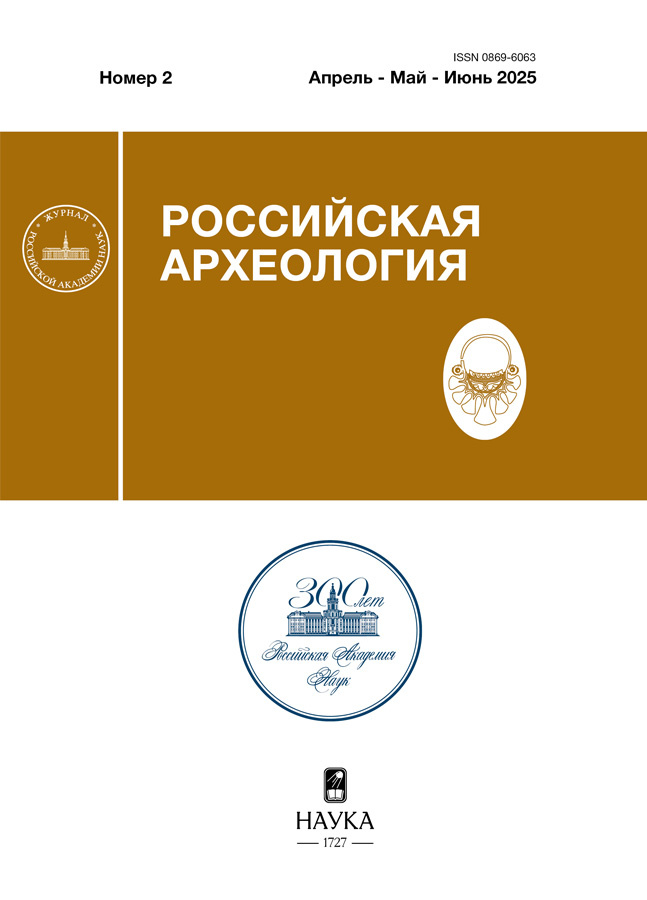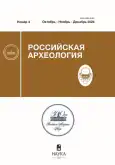“Idols of moab”: forging antiquities of the Holy Land
- Authors: Tchekhanovets Y.1, Belyaev L.A.2
-
Affiliations:
- Ben-Gurion University of the Negev
- Institute of Archaeology of the RAS
- Issue: No 4 (2024)
- Pages: 187-197
- Section: HISTORY OF SCIENCE
- URL: https://gynecology.orscience.ru/0869-6063/article/view/655818
- DOI: https://doi.org/10.31857/S0869606324040149
- EDN: https://elibrary.ru/KHIJOI
- ID: 655818
Cite item
Abstract
The article publishes materials from the collection of Archimandrite Antonin Kapustin, head of the Russian Ecclesiastic Mission (1865–1894), kept in the Russian monastery on the Mount of Olives in Jerusalem. These include 69 small figurines made by order of W.-M. Shapira in the 1870s. The forgery was soon exposed by Charles Clermont-Ganneau. The selection of figurines in Father Antonin’s collection is probably the most representative of those that have survived. These are mainly small anthropomorphic sculptures molded with great imagination. In some cases, their surface is decorated with “Phoenician” letters and modest decor of small dots. The composition often uses two masks (human faces) or two heads. Mediterranean archaic was chosen as the style. The article provides an outline of modern research into falsifications in the archaeology of Jerusalem. The authors assess the uniqueness of the Russian pilgrimage tradition and its influence on the formation of the Russian collection of Archimandrite Antonin (Kapustin) in the Ascension Monastery on the Mount of Olives.
Full Text
About the authors
Ya. Tchekhanovets
Ben-Gurion University of the Negev
Author for correspondence.
Email: yanatchk@bgu.ac.il
Israel, Beer Sheva
L. A. Belyaev
Institute of Archaeology of the RAS
Email: labeliaev@bk.ru
Russian Federation, Moscow
References
- Allegro J.M., 1965. The Shapira Affair. New York: Doubleday. 140 p.
- Avigad N., 1976a. The Governor of the City. Israel Exploration Journal, 26, pp. 178–182.
- Avigad N., 1976b. Bullae and Seals from a Post-Exilic Judean Archive. Jerusalem: Hebrew University. 36 p. (Qedem, 4).
- Avigad N., 1986. Hebrew Bullae from Time of Jeremiah. Jerusalem: Israel Exploration Society. 140 p.
- Avigad N., 1997. Corpus of West Semitic Stamp Seals. Jerusalem: Hebrew University of Jerusalem. 670 p.
- Avigad N., 2000. The “Governor of the City” Bulla. Ancient Jerusalem Revealed. H. Geva, ed. Jerusalem: Israel Exploration Society, pp. 138–140.
- Barkay G., 2000. A Second “Governor of the City” Bulla. Ancient Jerusalem Revealed. H. Geva, ed. Jerusalem: Israel Exploration Society, pp. 141–144.
- Belyaev L.A., 2011. Notes on counterfeits in archaeology. Fal'sifikatsiya istoricheskikh istochnikov i konstruirovanie etnokraticheskikh mifov [Forgery of historical sources and the construction of ethnocratic myths]. Moscow: Institut arkheologii Rossiyskoy akademii nauk, pp. 51–66. (In Russ.)
- Belyaev L.A., 2024. This elusive original (Electronic resource). Podlinnik. Voprosy atributsii i restavratsii: elektronnyy zhurnal [Original. Issues of attribution and restoration: electronic journal], 1, pp. 8–18. URL: https://podlinnik-fii.ru/upload/main/podlinnik/doc/Подлинник-1%20(1-2024).pdf. (In Russ.)
- Belyaev L.A., Vakh K.A., 2022. People and excavations: Archimandrite Antonin (Kapustin) at the Russian site in Jerusalem. Za siney ptitsey (antropologiya akademicheskoy zhizni): pamyati G.A. Komarovoy [For the blue bird (anthropology of academic life): in memory of G.A. Komarova]. E.-B. Guchinova, V.A. Shnirel'man, eds. Moscow: Grifon, pp. 207–242. (In Russ.)
- Chekhanovets Ya., Belyaev L.A., 2020. The Palestinian Museum of Antonin Kapustin: current state and perspectives of research. Vizantiyskiy vremennik [BYZANTINA XRONIKA], 103 (2019), pp. 228–255. (In Russ.)
- Clermont-Ganneau Ch., 1870. La stèle de Dhiban ou stèle de Mesa roi de Moab 896 av. J.-C.: lettre à M. le Cte de Vogüé. Paris: J. Baudry. 60 p.
- Clermont-Ganneau Ch., 1874. The Shapira Collection. Palestine Exploration Fund Quarterly Statement, 6, 2, pp. 114–124.
- Clermont-Ganneau Ch., 1885. Les fraudes archéologiques en Palestine. Paris: Leroux. 357 p.
- Cook E., 2005. The Forgery Indictments and BAR: Learning from Hindsight. Near Eastern Archaeology, vol. 68, no. 1–2, pp. 73–75.
- Corpus Inscriptionum Iudaeae/Palaestinae, vol. I. Jerusalem, part 1. 1–704. H.M. Cotton, ed. Berlin: Walter de Gruyter, 2010. 694 p.
- Dershowitz I., 2021. The Valediction of Moses: New Evidence on the Shapira Deuteronomy Fragments. Zeitschrift für die alttestamentliche Wissenschaft, 133, 1, pp. 1–22.
- Doroshevich V.I., 1900. V zemle obetovannoy (Palestina) (Elektronnyy resurs) [In the Promised Land (Palestine) (Electronic resource)]. St. Petersburg. URL: https://azbyka.ru/otechnik/Istorija_Tserkvi/v-zemle-obetovannoj-palestina/.
- Goren Y., 2005. The Jerusalem Syndrome in Biblical Archaeology (Electronic resource). Society of Biblical Literature. URL: https://www.sbl-site.org/publications/article.aspx?articleId=374.
- Guil S., 2017. The Shapira Scroll was an Authentic Dead Sea Scroll. Palestine Exploration Quarterly, vol. 149, iss. 1, pp. 6–27.
- Heide M., 2012. The Moabitica and Their Aftermath: How to Handle a Forgery Affair with an International Impact. New Inscriptions and Seals Relating to the Biblical World. M. Lubetski, ed. Atlanta, pp. 193–241. (Archaeology and Biblical Studies; 19).
- Hummel R., Hummel T., 1995. Patterns of the Sacred. London; Jerusalem: Scorpion Cavendish. 112 p.
- Hummel T., 2019. Jerusalem as a Christian Sacrament. Jerusalem Quarterly. Pilgrims and Pilgrimage, 78, pp. 54–78.
- Jacobson D., Cobbing F., 2005. “A Record of Discovery and Adventure”. Claude Reignier Conder's Contributions to the Exploration of Palestine. Near Eastern Archaeology, vol. 68, no. 4, pp. 166–179.
- Menant M.J., 1888. Les fausses antiquités de l'Assyrie et de la Chaldée. Рагіs: E. Leroux. 107 p.
- Nikon (Golovko D.S.), 2022. Vladeniya Russkoy Dukhovnoy Missii Moskovskogo Patriarkhata v Svyatoy Zemle: tserkovnaya znachimost', istoriya, sovremennyy status: dissertatsiya … kandidata bogosloviya [Property of the Russian Ecclesiastical Mission of the Moscow Patriarchate in the Holy Land: ecclesiastical significance, history, modern status: a thesis for the degree in Theology]. Moscow. 320 p.
- Ornan T., Weksler-Bdolah S., Sass B., 2019. A “Governor of the City” Seal Impression from the Western Wall Plaza Excavations in Jerusalem. Ancient Jerusalem Revealed: Archaeological Discoveries, 1998–2018. H. Geva, ed. Jerusalem: Israel Exploration Society, pp. 67–72.
- Palästina und Syrien: Handbuch für Reisende. Leipzig: K. Baedeker, 1875. 674 p.
- Palestine et Syrie: Manuel du voyageur. Leipzig: K. Baedeker, 1882. 736 p.
- Press M., 2022. The Career of Moses Shapira, Bookseller and Antiquarian. Palestine Exploration Quarterly, vol. 155, iss. 3, pp. 230–253.
- Reiner F.C.D., 1995. Ginsburg and the Shapira Affair: A Nineteenth-Century Dead Sea Scroll Controversy. The British Library Journal, vol. 21, iss. 1, pp. 109–127.
- Romodanovskaya V.A., 2024. Spiritual archaeology, Jerusalem, and Archimandrite Antonin Kapustin. Istoricheskie zapiski [Historical Notes], 23 (141). Moscow. (In print). (In Russ.)
- Rostovtsev M.I., 1912. Russian archaeology in Palestine. Khristianskiy Vostok [Christian Orient], vol. 1, iss. 3, pp. 247–266. (In Russ.)
- Sabo Y., 2013. Between Apostate and Forger: Moses Wilhelm Shapira and the Moabite Pottery Affair (Electronic resource). Zmanim, 123, pp. 70–81. URL: https://www.academia.edu/24911481/ Between_ Apostate_ and_Forger_Moses Wilhelm_Shapira_and_the_Moabite_Pottery_Affair.
- Salmon I., 2000. “Truly Faked”: Moses Wilhelm Shapira, Master Forger. Exhibition: Catalogue. Jerusalem.
- Silberman N.A., 1982. Digging for God and Country: Exploration, Archeology, and the Secret Struggle for the Holy Land, 1799–1917. New York: Knopf. 228 p.
- Tolstoy I.I., 1890. Forged Assyrian antiquities. Zapiski Vostochnogo otdeleniya Imperatorskogo Russkogo Arkheologicheskogo obshchestva [Notes of the Eastern Department of the Imperial Russian Archaeological Society], 4 (1889). St. Petersburg, pp. 21–28. (In Russ.)
- Viktor (Ostrovidov), 2012. Jerusalem Mission. Svyataya Zemlya [Holy Land], 1, pp. 256–265. (In Russ.)
- Voroshilova O.M., Zhuravlev D.V., 2023. The vessel with relief from the collection of the Archimandrite Antonin (Kapustin) in Jerusalem. Kratkie soobshcheniya Instituta arkheologii [Brief Communications of the Institute of Archaeology], 273, pp. 382–394. (In Russ.)
Supplementary files









